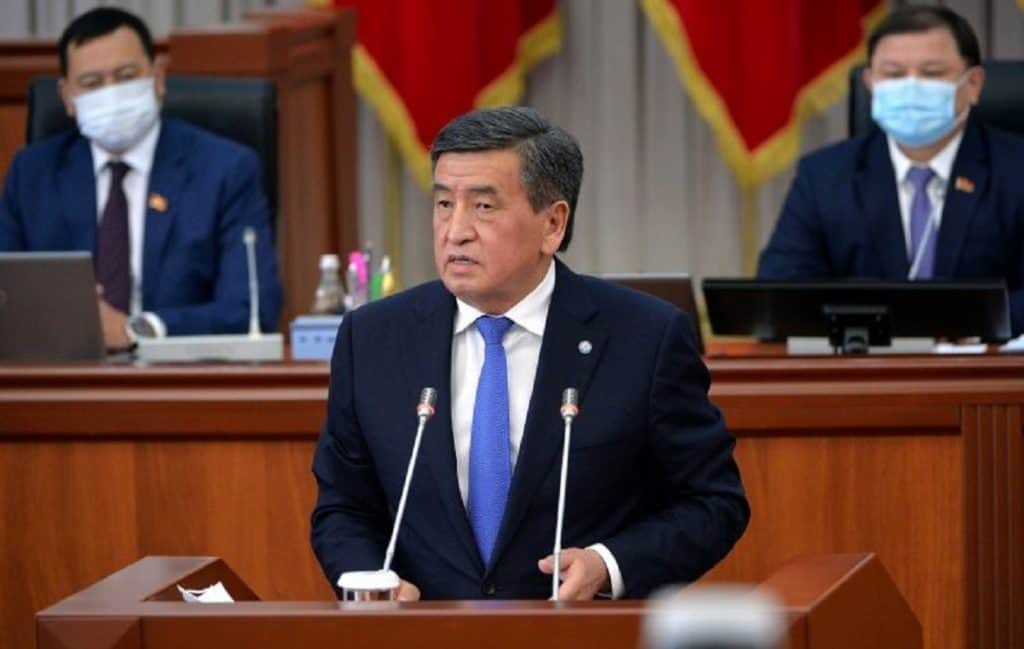By Nikola Mikovic
Kyrgyzstan will hold parliamentary elections on October 4 amid economic crisis caused by COVID-19 pandemic. There are fears that the Central Asian country could face destabilization and waves of protests after the vote, although a regime change in Bishkek does not seem very realistic at this point.

The former Soviet republic has a history of post-election mass protests that led to change of the nation’s leadership. For instance, Kyrgyzstan had its first regime change in 2005 after the parliamentary elections. Mass demonstrations resulted in the overthrow of then President Askar Akayev. Also, another Kyrgyz leader, Kurmanbek Bakiyev, was ousted during the so-called People’s April Revolution in April 2010, while former President Almazbek Atambayev was arrested in August 2019 and sentenced to 11 years and two months in prison on corruption charges.
Current President Sooronbay Jeenbekov managed to establish good relations with both Russia and China – the two foreign powers have different geopolitical interests in the Central Asian state – which means Moscow and Beijing will unlikely force a regime change in Bishkek. On the other hand, the influence of the Western powers in Kyrgyzstan is not as strong as it is in Belarus who has been facing destabilization since the controversial presidential elections held on August 9. That, however, does not mean that the country will stay immune to political unrest. Prior to the start of the election campaign, the Central Election Commission refused to register the Butun Kyrgyzstan (United Kyrgyzstan) political party for parliamentary elections.
A court in Bishkek has later reversed the Commission decision, apparently in fear of potential violent protests. Thus, it is possible that some of the 16 parties that are set to stand in parliamentary elections will stage demonstrations claiming that the vote was rigged, although “Belarusian scenario” in Kyrgyzstan in not very probable.
Still, regardless of the election results, Kyrgyzstan will have to cope with difficult economic situation. According to the official information, as of the end of July, the total state debt of the Central Asian republic was $ 4.824 billion. The main Bishkek’s lender is Beijing, to which Kyrgyzstan owes $ 1.8 billion. It is worth noting that the highest state debt in Kyrgyzstan was at the end of January 2018 – $ 4.139 billion. There are speculations that China could request from Bishkek to hand over certain portion of Kyrgyzstan’s land to the People’s Republic, if the former Soviet republic proves to be unable to pay its loans back. In 2011 such a precedent happened to neighboring Tajikistan, which ceded part of its territory in Upper Badakhshan to China.
However, Beijing is aware that such an action would cause anti-Chinese, as well as anti-government sentiment among the Kyrgyzstan’s population, which is why China will likely seek other ways to get its money back. Indeed, only the skill of the Kyrgyz negotiators will determine the price the country will pay for the restructuring of its debt.
Besides China, Russian Federation also provided significant loans to Kyrgyzstan. There are speculations that Kyrgyz authorities aim to sell the state-owned railway enterprise Kyrgyz Temir Zholu to Russia, although the country’s officials denied such accusations. Moscow, on the other hand, is reportedly interested in participation in the construction of the China-Kyrgyzstan-Uzbekistan railway. The project is directly related to the Kremlin’s desire not to lose its influence in Central Asia after Beijing completes the corridor that will cement its position in the region.
According to Kyrgyzstan’s President Jeenbekov, an agreement has been reached at the highest level with Russia to participate in this project. It remains to be seen what will be the route of the railway, and what will the Kremlin get in an exchange for this corridor that is expected to significantly undermine its position in the region and pave the way for China to increase its power in Central Asia.
Presently, Kyrgyzstan is seen as Russia’s most reliable ally in the region. The country is part of Russia-dominated organizations such as Collective Security Treaty Organization, Eurasian Union and Commonwealth of Independent States. It hosts Russian air-base in the city of Kant, and Kyrgyz economy is heavily integrated with the Russian one. In January 2019, the Kyrgyzstani State Migration Service reported that 750,000 Kyrgyzstanis work outside the country, with more than 640,000 in Russia, which is about ten percent of the country’s population.
In 2018, expatriates sent home to Kyrgyzstan more than $2,685,000,000, and in spite of the coronavirus crisis only about 20.000 of the Kyrgyz migrants came back to their homeland. Raimkul Attakurov, Chairman of the Coordinating Council of the Kyrgyz Diaspora in Moscow and former Kyrgyz ambassador to Russia, recently reportedly said that there are ideas in Kyrgyzstan about joining the Russian Federation. Kyrgyzstan’s embassy in Moscow, on the other hand, said that there are no serious grounds for such statements. The diplomatic mission added that Attakurov is a Russian citizen and had expressed his personal opinion as a private person.
In any case, the country will remain heavily linked with Russia, regardless of the outcome of the parliamentary elections, although it will unlikely formally join the Russian Federation. Moscow is expected to keep treating Kyrgyzstan as a reliable client-state, and will certainly try to ease tensions in the post-elections period.
Author: Nikola Mikovic (Freelance journalist, researcher and analyst based in Serbia. He covers mostly the foreign policies of Russia, Belarus and Ukraine. He writes for several publications)
(The opinions expressed in this article are solely those of the authors and do not necessarily reflect the views of World Geostrategic Insights)







